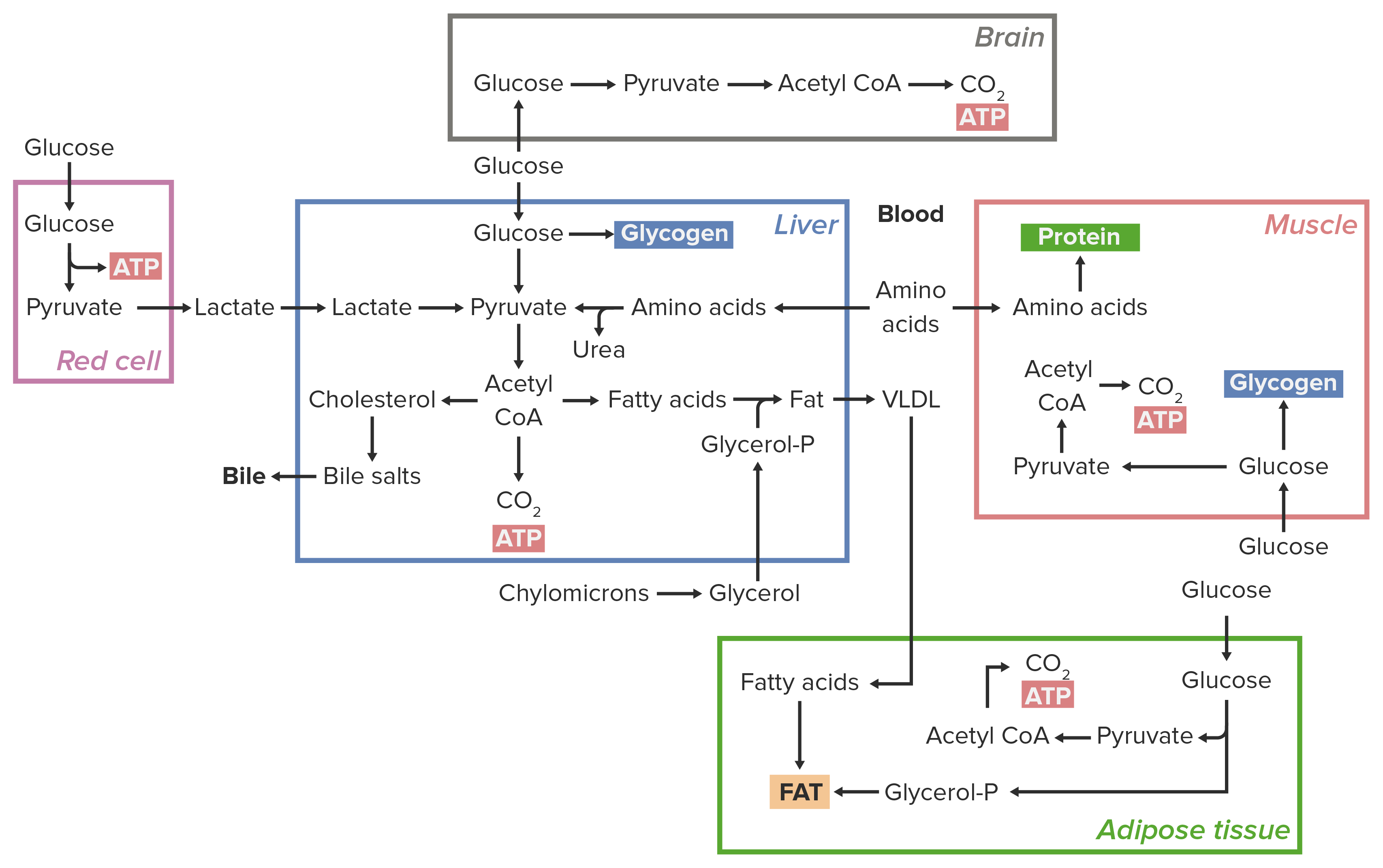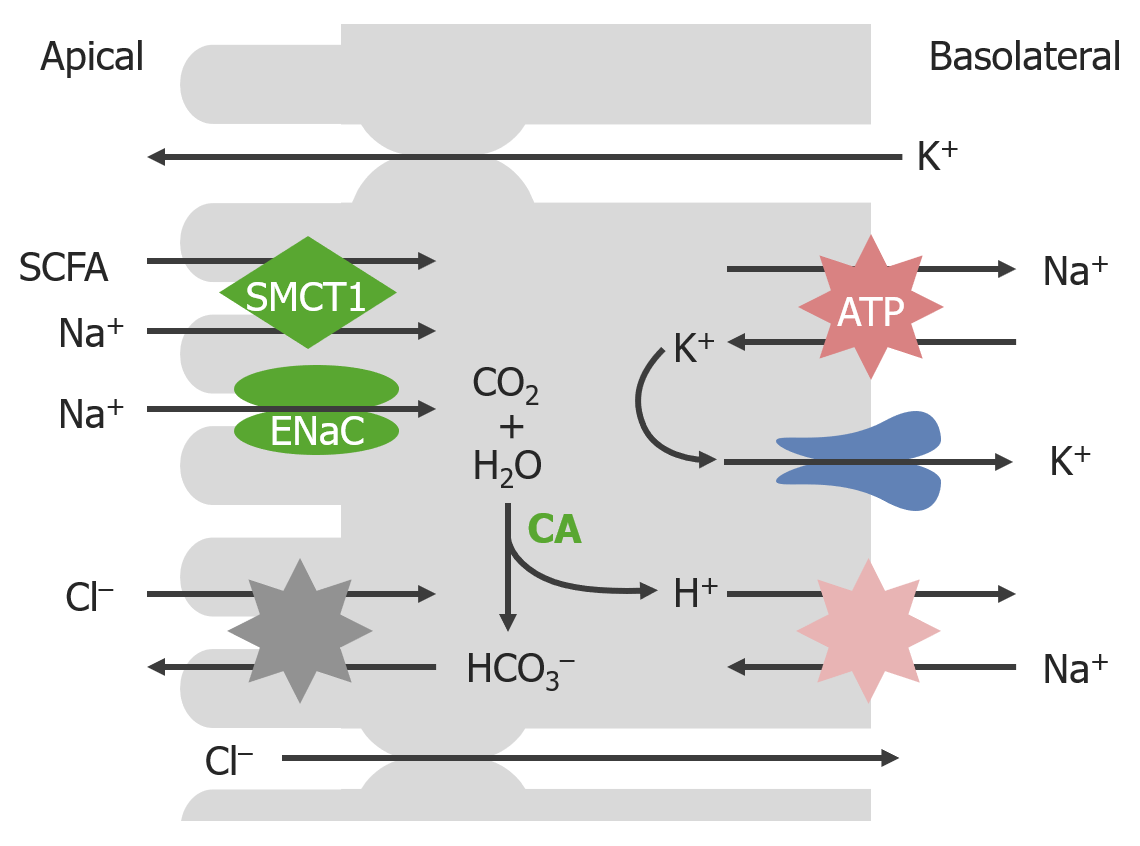Playlist
Show Playlist
Hide Playlist
Catabolism of Fats and Proteins
-
Slides 18 RegulationOfCellRespiration CellBiology.pdf
-
Download Lecture Overview
00:00 We'll begin by taking a little closer look at the fats. 00:05 First of all, fats you'll recall are non-polymer macromolecules and they're broken into their constituent fatty acids and glycerol molecules. So glycerol will enter the pathway for metabolism in glycolysis. 00:22 One of the intermediates in glycolysis that you don't really need to know. Just that it comes in in glycolysis and then will go through and be made into pyruvate and in the future will become Acetyl CoA. 00:34 The fatty acids on the other hand undergo a process called beta oxidation to make them into two carbon molecules which will then enter as Acetyl CoA. 00:46 So in beta oxidation, we are taking a fatty acid chain which could have single bonds or double bonds, but we're cleaving it in two carbon subunits. So this image represents, green dots representing carbons. 01:01 They're cleaved in two carbon subunits which is an acetyl group, and then added to coenzyme A. 01:08 Coenzyme A joins it and these can freely join the Krebs cycle and we can generate much ATP from these fatty acid tails. 01:18 So now let's take a look at how proteins are catabolized. Proteins are composed of amino acids and proteins that we consume get broken down into amino acids during the process of digestion Those amino acids then become absorbed and we will break them down to enter into the process of cell respiration but only really if we're starving. Because as I said earlier, we really don't need to be just breaking down any old proteins. But if we need to use them in the process of metabolism then we will first deaminate them, take the amino groups off. And then they will enter at various points during glycolysis or pyruvate oxidation and the Krebs cycle. So they're not as easy or straight lined as carbohydrates or fats are in this whole process. 02:12 Lets look at deamination for a moment. For example if we take glutamate and we remove the amino group, then we can form α-Ketoglutarate. α-Ketoglutarate is one of the intermediates we see in the Krebs cycle and so it fits right in there The problem with breaking down amino acids is also we generate a lot of these nitrogeneous bases or NH3's and so NH3's can be sort of toxic to the system. They are actually broken down and form urea and are excreted in the urine. So, a lot of protein breakdown results in a lot of extra urea in urine. 02:53 And proteins will or is their amino acids are going to enter as we saw at various points during the Krebs cycle or glycolysis or pyruvate oxidation. And here you can see an example of how some of these amino acids might go into the cycle. For example you'll see a group that enters as pyruvate. We see a group that enters as acetyl CoA. 03:18 We can see the α-Ketoglutarate here. As well as at Fumarate or Succinyl-CoA. 03:25 So each amino acid has a specific place that it could enter the Krebs cycle. Again, it takes a few conversions, few groups being cut off for them to be able to enter as those intermediates that you see in this image.
About the Lecture
The lecture Catabolism of Fats and Proteins by Georgina Cornwall, PhD is from the course Energy, Enzymes and Metabolism.
Included Quiz Questions
Fatty acids are converted into which of the following molecules for entry into the Krebs cycle?
- Acetyl-CoA
- Oxaloacetate
- α-Ketoglutarate
- Pyruvate
- Fumarate
An increase in protein consumption will lead to which of the following?
- An increase in the production of urea
- A decrease in the production of urea
- An increase in fat synthesis
- A decrease in the production of Krebs cycle intermediates
- A decrease in the production of NH3
Customer reviews
5,0 of 5 stars
| 5 Stars |
|
5 |
| 4 Stars |
|
0 |
| 3 Stars |
|
0 |
| 2 Stars |
|
0 |
| 1 Star |
|
0 |





